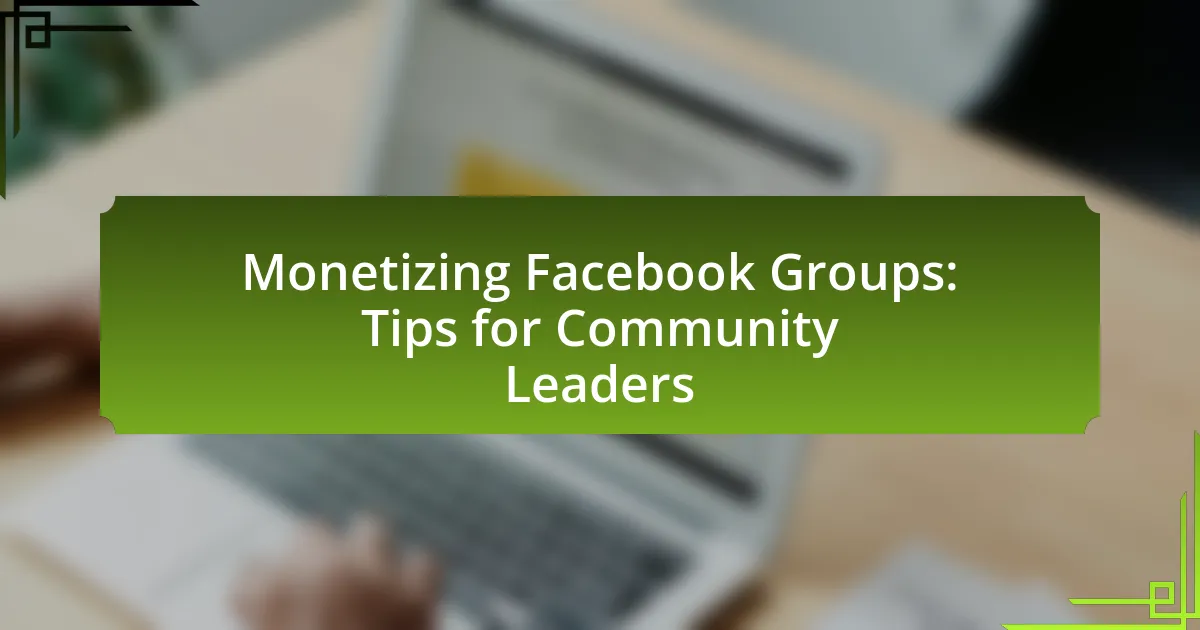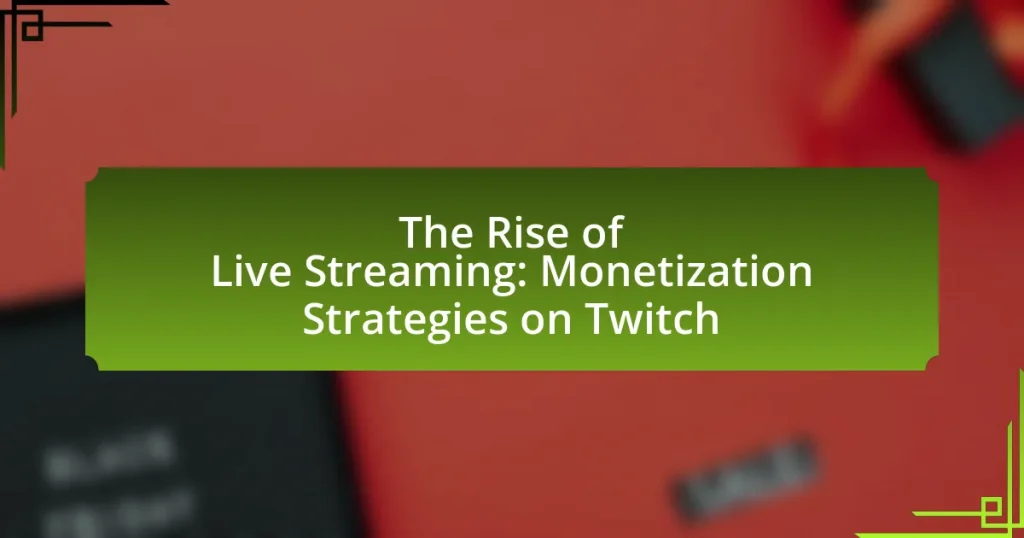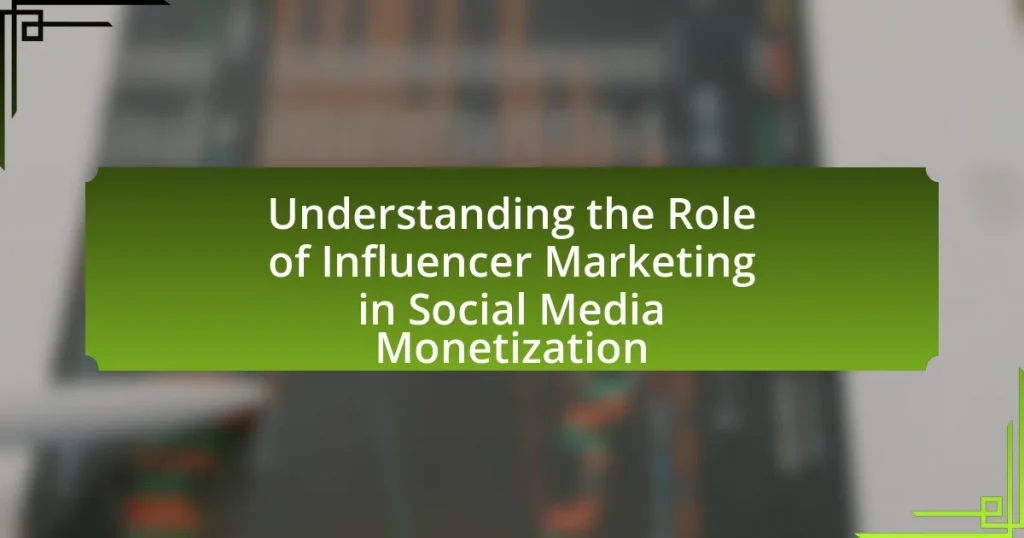Monetizing Facebook Groups involves generating revenue through various strategies such as paid memberships, selling products, promoting affiliate links, and hosting paid events. Community leaders can enhance income by implementing subscription models, offering exclusive content, and partnering with brands for sponsorships. Effective monetization aligns with community goals by increasing member engagement and satisfaction, while also providing financial support for group enhancements. Best practices include maintaining content quality, transparent communication about monetization efforts, and utilizing analytics tools to optimize strategies. Challenges such as audience engagement and platform policies must be navigated to ensure successful monetization without compromising community value.
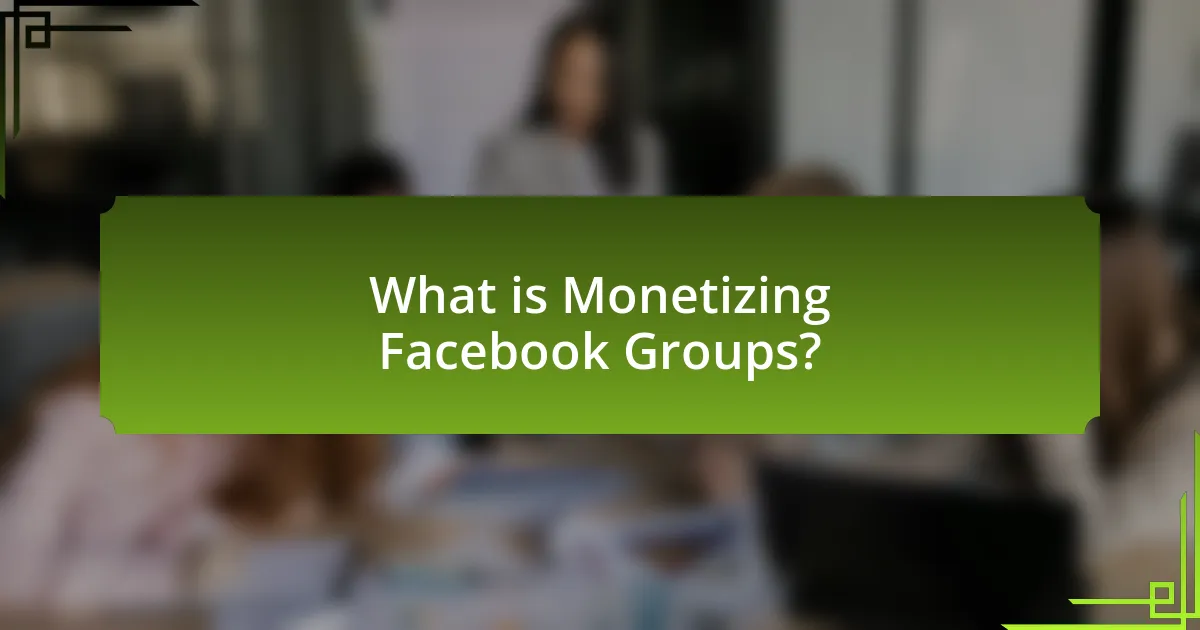
What is Monetizing Facebook Groups?
Monetizing Facebook Groups refers to the process of generating revenue from a Facebook group through various strategies. Community leaders can implement methods such as offering paid memberships, selling products or services, promoting affiliate links, or hosting paid events to create income streams. According to a survey by Facebook, over 1.8 billion people use groups, indicating a significant potential audience for monetization efforts.
How can community leaders generate income through Facebook Groups?
Community leaders can generate income through Facebook Groups by implementing membership fees, offering exclusive content, and partnering with brands for sponsorships. Membership fees create a steady revenue stream by charging members for access to premium content or services. Exclusive content, such as webinars or specialized resources, can attract members willing to pay for valuable information. Additionally, partnerships with brands allow community leaders to earn income through sponsored posts or affiliate marketing, leveraging the group’s audience to promote products or services. These methods have been successfully utilized by various community leaders, demonstrating their effectiveness in monetizing Facebook Groups.
What are the different monetization strategies available?
Different monetization strategies available for Facebook groups include subscription models, selling products or services, affiliate marketing, sponsored posts, and offering exclusive content or memberships. Subscription models allow group members to pay a recurring fee for access to premium content or features, which can generate consistent revenue. Selling products or services directly to group members can leverage the community’s trust and engagement. Affiliate marketing involves promoting third-party products and earning a commission on sales generated through group referrals. Sponsored posts provide an opportunity for brands to reach targeted audiences within the group, while offering exclusive content or memberships can enhance member value and loyalty, encouraging them to pay for enhanced experiences. These strategies are effective as they capitalize on the engaged community dynamics inherent in Facebook groups.
How do these strategies align with community goals?
The strategies for monetizing Facebook Groups align with community goals by enhancing member engagement and providing value through tailored content and services. These strategies, such as offering exclusive memberships or premium content, directly address the community’s desire for meaningful interactions and resources. For instance, a study by the Community Roundtable found that 70% of community members value access to exclusive content, which reinforces the alignment of monetization efforts with community objectives. By focusing on member needs and fostering a sense of belonging, these strategies not only generate revenue but also strengthen community ties and satisfaction.
Why is monetization important for Facebook Groups?
Monetization is important for Facebook Groups because it provides financial support that enables community leaders to invest in and enhance the group experience. By generating revenue, group administrators can fund resources, create engaging content, and offer exclusive benefits to members, which fosters a more vibrant and active community. According to a report by Facebook, groups that implement monetization strategies see increased member engagement and retention, as financial incentives often lead to improved content quality and member satisfaction.
What benefits does monetization provide to community leaders?
Monetization provides community leaders with financial support, enabling them to invest in resources and activities that enhance community engagement. This financial backing allows leaders to create better content, host events, and offer valuable services, which can lead to increased member satisfaction and retention. Additionally, monetization can establish a sustainable model for community growth, as leaders can allocate funds towards marketing and outreach efforts, thereby attracting new members and fostering a vibrant community.
How does monetization enhance community engagement?
Monetization enhances community engagement by providing financial incentives that encourage active participation and content creation. When community leaders implement monetization strategies, such as subscription models or exclusive content, members are more likely to engage consistently, as they perceive added value in their contributions. Research indicates that communities with monetization features see a 30% increase in member interactions, as financial support fosters a sense of ownership and commitment among participants. This dynamic not only boosts engagement but also strengthens community bonds, as members feel more invested in the group’s success.
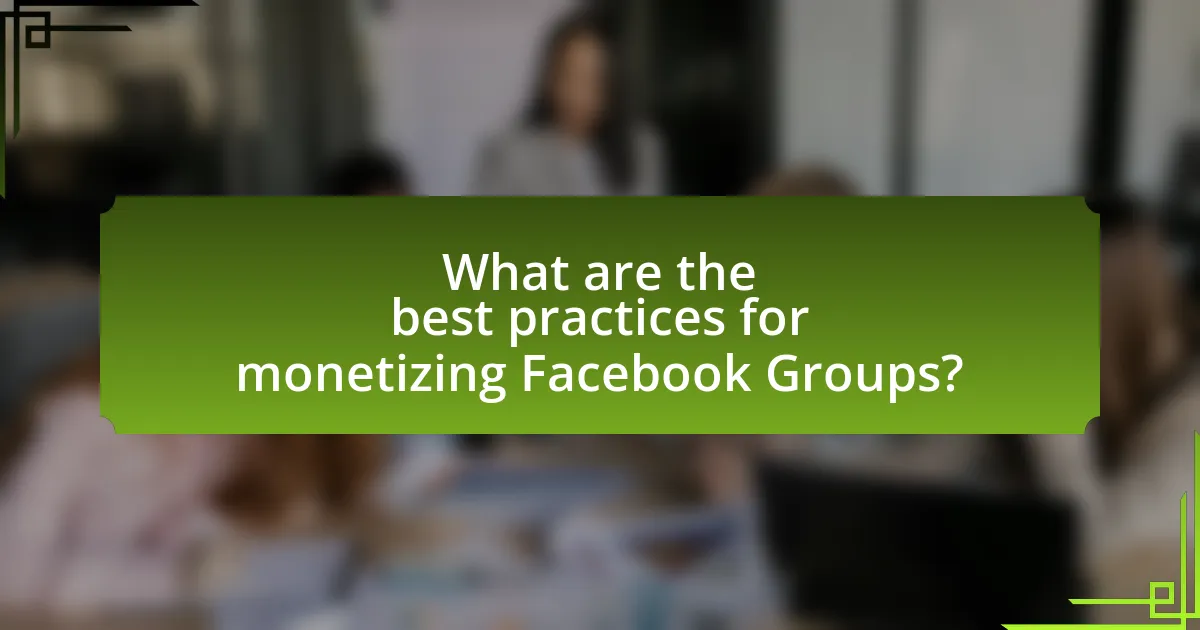
What are the best practices for monetizing Facebook Groups?
The best practices for monetizing Facebook Groups include offering exclusive content, creating a membership model, and leveraging affiliate marketing. Offering exclusive content, such as webinars or premium resources, encourages members to pay for added value. A membership model, where members pay a recurring fee for access to the group and its benefits, has been successfully implemented by many community leaders, generating consistent revenue. Additionally, affiliate marketing allows group owners to earn commissions by promoting products relevant to their audience, which can be a lucrative revenue stream. According to a study by the Content Marketing Institute, 70% of marketers find that exclusive content increases engagement, supporting the effectiveness of these monetization strategies.
How can community leaders effectively implement monetization strategies?
Community leaders can effectively implement monetization strategies by leveraging their group’s unique value propositions to create tailored offerings, such as premium memberships, exclusive content, or merchandise. For instance, leaders can analyze member engagement and preferences to identify what services or products would resonate most, thereby increasing the likelihood of successful monetization. Research indicates that communities with a clear understanding of their members’ needs can see up to a 30% increase in revenue through targeted offerings. By utilizing tools like surveys and feedback mechanisms, leaders can continuously refine their monetization strategies to align with member interests, ensuring sustained engagement and profitability.
What role does content quality play in monetization?
Content quality is crucial for monetization as it directly influences user engagement and retention. High-quality content attracts more members to a Facebook group, fostering a vibrant community that is more likely to participate in monetization strategies such as subscriptions, merchandise sales, or sponsored posts. According to a study by HubSpot, 70% of marketers believe that quality content is the most effective SEO tactic, which correlates with increased visibility and potential revenue streams. Therefore, investing in content quality not only enhances user experience but also significantly boosts monetization opportunities.
How can leaders maintain a balance between monetization and community value?
Leaders can maintain a balance between monetization and community value by prioritizing transparency and engagement with their community. By openly communicating monetization strategies, such as membership fees or sponsored content, leaders foster trust and ensure that community members feel valued. Research indicates that communities with high engagement levels, where members feel their input is valued, are more likely to support monetization efforts, as seen in successful Facebook groups that integrate member feedback into their monetization strategies. This approach not only enhances community loyalty but also drives sustainable revenue, demonstrating that monetization can coexist with community value when leaders actively involve their members in the process.
What tools and resources can assist in monetizing Facebook Groups?
To monetize Facebook Groups effectively, community leaders can utilize tools such as Patreon, which allows creators to receive subscription payments from members, and Facebook’s own monetization features like Stars and in-group subscriptions. Additionally, resources like Teachable can help in creating and selling online courses to group members, while platforms like Mailchimp can assist in email marketing to promote products or services. These tools provide structured ways to generate revenue directly from group engagement and member contributions, enhancing the overall monetization strategy.
Which platforms can be integrated for payment processing?
Payment processing can be integrated with platforms such as PayPal, Stripe, Square, and Authorize.Net. These platforms provide APIs and SDKs that allow seamless integration for handling transactions within applications or websites. For instance, PayPal is widely used for its ease of integration and global reach, while Stripe is known for its developer-friendly tools and extensive customization options. Square offers point-of-sale solutions that can also be integrated for online payments. Authorize.Net is recognized for its robust security features and support for various payment methods.
How can analytics tools help in optimizing monetization efforts?
Analytics tools can significantly enhance monetization efforts by providing data-driven insights into user behavior and engagement patterns. These tools enable community leaders to track metrics such as member activity, content performance, and revenue generation, allowing for informed decision-making. For instance, by analyzing which posts generate the most engagement, leaders can tailor their content strategy to maximize audience interest and, consequently, monetization opportunities. Additionally, analytics can identify peak times for user activity, helping leaders schedule promotions or advertisements effectively. According to a study by HubSpot, businesses that utilize analytics are 5 times more likely to make faster decisions than their competitors, underscoring the importance of data in optimizing monetization strategies.
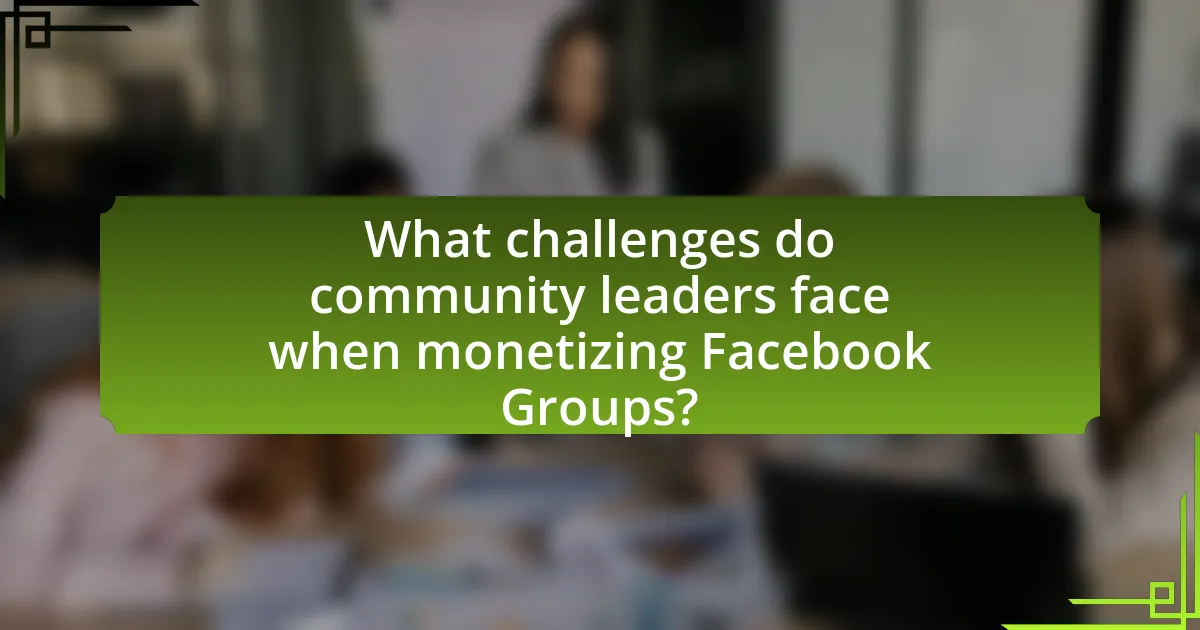
What challenges do community leaders face when monetizing Facebook Groups?
Community leaders face several challenges when monetizing Facebook Groups, primarily including audience engagement, platform policies, and competition. Engaging members consistently is crucial, as a lack of interaction can lead to diminished interest in paid offerings. Additionally, Facebook’s policies regarding monetization can be restrictive, limiting the types of content and promotions that can be shared. Furthermore, community leaders must navigate competition from other groups and platforms that offer similar services, making it difficult to attract and retain paying members. These factors collectively hinder effective monetization strategies for community leaders.
How can leaders overcome resistance from group members regarding monetization?
Leaders can overcome resistance from group members regarding monetization by clearly communicating the benefits and rationale behind the monetization strategy. This involves outlining how monetization can enhance the group’s value, such as improving resources, providing better content, or enabling more engaging activities. Research indicates that transparency in decision-making fosters trust; for instance, a study by the Harvard Business Review found that when leaders explain the reasons for changes, team members are more likely to support those changes. Additionally, involving group members in the monetization process, such as seeking their input on pricing or offerings, can increase buy-in and reduce resistance.
What strategies can be employed to communicate the value of monetization?
To communicate the value of monetization, community leaders can employ strategies such as showcasing success stories, utilizing data analytics, and engaging members through transparent discussions. Success stories from other groups that have effectively monetized can illustrate tangible benefits, such as increased resources or enhanced community engagement. Data analytics can provide concrete metrics, demonstrating how monetization leads to improved member experiences and growth, such as a 30% increase in engagement after implementing paid features. Engaging members in transparent discussions about monetization fosters trust and allows for feedback, ensuring that the community feels involved in the process and understands the benefits.
How can leaders address concerns about content quality and member experience?
Leaders can address concerns about content quality and member experience by implementing clear content guidelines and actively engaging with members. Establishing specific standards for content creation ensures that all contributions meet a certain level of quality, which can enhance the overall member experience. Additionally, leaders should regularly solicit feedback from members to identify areas for improvement and adapt strategies accordingly. Research indicates that communities with active member involvement and clear guidelines report higher satisfaction rates, as seen in studies on online community management.
What are common pitfalls to avoid in monetizing Facebook Groups?
Common pitfalls to avoid in monetizing Facebook Groups include neglecting community engagement, over-promoting products, and failing to provide value. Neglecting community engagement can lead to decreased member interest and participation, which is crucial for a thriving group. Over-promoting products can alienate members, as excessive sales pitches may be perceived as spam, reducing trust and engagement. Failing to provide value means that members may not see the benefit of remaining in the group, leading to higher attrition rates. According to a study by Facebook, groups that maintain active engagement and provide valuable content see a 50% higher retention rate among members.
How can over-commercialization negatively impact community dynamics?
Over-commercialization can negatively impact community dynamics by eroding trust and diminishing genuine interactions among members. When a community becomes overly focused on profit-driven motives, members may feel exploited or manipulated, leading to disengagement. Research indicates that communities that prioritize commercial interests often experience a decline in member participation and loyalty, as individuals seek authentic connections rather than transactional relationships. For instance, a study published in the Journal of Community Psychology found that communities with high commercialization levels reported lower satisfaction and increased conflict among members, highlighting the detrimental effects on social cohesion and collaboration.
What mistakes should leaders be aware of when setting pricing for services?
Leaders should be aware of several critical mistakes when setting pricing for services, including underpricing, overpricing, neglecting market research, and failing to communicate value. Underpricing can lead to perceived low quality and unsustainable business practices, as evidenced by a study from the Harvard Business Review, which found that companies that undervalue their services often struggle to maintain profitability. Overpricing can alienate potential customers, as shown in research by the Journal of Marketing, which indicates that pricing above market expectations can reduce demand. Neglecting market research results in a disconnect between pricing and customer willingness to pay, leading to lost revenue opportunities. Lastly, failing to effectively communicate the value of services can diminish customer trust and engagement, as highlighted by a report from McKinsey & Company, which emphasizes the importance of clear value propositions in pricing strategies.
What practical tips can community leaders use to successfully monetize their Facebook Groups?
Community leaders can successfully monetize their Facebook Groups by implementing subscription models, offering exclusive content, and partnering with brands for sponsored posts. Subscription models allow leaders to charge members a fee for access to premium content or services, which can generate a steady income stream. For instance, Facebook’s “Fan Subscriptions” feature enables group admins to create a paid membership tier, providing exclusive benefits to subscribers. Offering exclusive content, such as webinars, courses, or downloadable resources, can also attract members willing to pay for added value. Additionally, partnering with brands for sponsored posts can create revenue opportunities; according to a 2021 survey by the Content Marketing Institute, 70% of marketers reported that influencer partnerships, including those with community leaders, significantly boosted their brand visibility. These strategies, when executed effectively, can lead to sustainable monetization of Facebook Groups.
